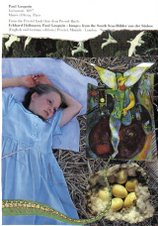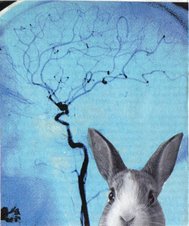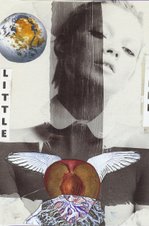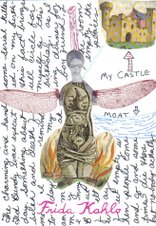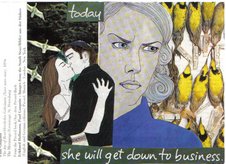 Photo: Poster for Pan's Labyrinth
Photo: Poster for Pan's LabyrinthI've noticed that when I stay close to my creative life, things can come together in the most unpredictable ways.
Such a happy occurrence happened this month, when my studies of Federico Garcia Lorca's essay on the "Duende," my reading of Lorca's poetry, and the opportunity to see Pan's Labyrinth all came together. Pan's Labyrinth never mentions Lorca, but it is set during the Spanish Civil War, during which Lorca was killed by firing squad.
It would be easy to write a spoiler review of Pan's Labyrinth. I don't want to rob anyone of the delight and the horror that awaits. I will say, however, that I was delighted to see women in such prominent roles, strong women, and delighted by the way fairytale and reality are woven together in such a way that you are made to question which is "reality." The movie is very rich, but it is disturbing at times, and even gory, in the way of Grimm Fairytales and 20Th Century War.
Pan's Labyrinth, I think, evokes what Lorca called "Duende"; it is a work of art composed of black notes. It is a story saturated from the roots up with themes of death and regeneration.
Lorca was a beautiful poet and human being. He was almost a Spanish version of William Blake, except Lorca fastened his attention much more on death than Blake. To understand Lorca, or even to begin to (and I make no claims of understanding Lorca), you have to be able to understand the fascination Spanish culture has with death, as expressed through bull fighting and also the dark, sad songs of the gypsies: "deep songs," Lorca called them. I came to Lorca through my study of James Wright and other American poets who discovered the Spanish poets and immersed themselves in their poems. I believe it was largely as a result of discovering the Spanish poets that Wright found, at last, his voice. Although death is at the heart, a wonderful spirit of transcendence marks the work of the Spanish poets.
Lorca believed intensely in the beauty of art and wrote poems with playful and often wild juxtapositions of imagery, such as in this poem:
Nobody is asleep on earth. Nobody, nobody.
Nobody is asleep.
In a graveyard far off there is a corpse
who has moaned for three years
because of a dry countryside on his knee;
and that boy they buried this morning cried so much
it was necessary to call out the dogs to keep him quiet.
Life is not a dream.Careful!Careful!Careful!
We fall down the stairs in order to eat the moist earth
or we climb to the knife edge of the snow with the voices of the dead
dahlias.
But forgetfulness does not exist, dreams do not exist;
flesh exists. Kisses tie our mouths
in a thicket of new veins,
and whoever his pain pains will feel that pain forever
and whoever is afraid of death will carry it on his shoulders.
One day
the horses will live in the saloons
and the enraged ants
will throw themselves on the yellow skies that take refuge in the
eyes of cows.
Another day
we will watch the preserved butterflies rise from the dead
and still walking through a country of gray sponges and silent boats
we will watch our ring flash and roses spring from our tongue.
Careful!Be careful!Be careful!
The men who still have marks of the claw and the thunderstorm,
and that boy who cries because he has never heard of the invention
of the bridge,
or that dead man who possesses now only his head and a shoe,
we must carry them to the wall where the iguanas and the snakes
are waiting,
where the bear's teeth are waiting,
where the mummified hand of the boy is waiting,
and the hair of the camel stands on end with a violent blue shudder.
--------------------------------------------------
Lorca's poems give the rational mind fits, but I think few people can deny the genius and the duende (soul) of these lines:
we will watch the preserved butterflies rise from the dead
and still walking through a country of gray sponges and silent boats
we will watch our ring flash and roses spring from our tongue.
May I be fortunate enough to live long enough to see such a day.
These lines were later shaped a new way by James Wright, who wrote of the human body being about ready to break into blossom.









